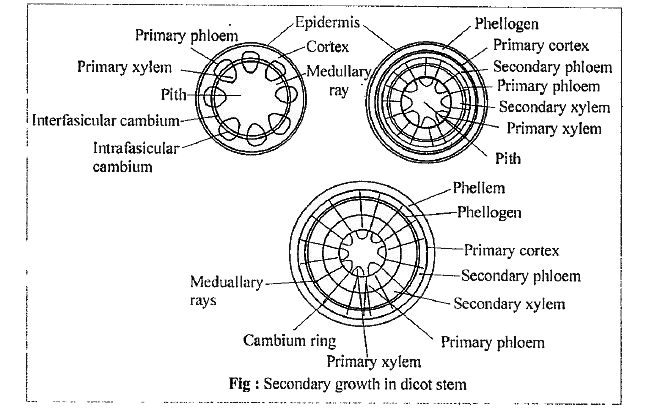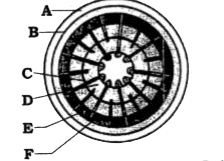Describe the process of secondary growth in dicot stem.
Text Solution
secondary xylem and secondary phloem.
(b) Ray intials : These are isodiametric in shape and produce parenchymatous rays in the secondary xylem and phloem.
(iii) Acitivity of vascular cambium : The cells of cambial rings always remain in a continuous state of division. They mostly divide periclinally and produce new cells towards both sides, Out of two cells, one cells forms secondary tissue and other remains as cambial cell.
(iv) Formation of secondary xylem and secondary phloem : The fusiform initial cells of vascular cambium divide periclinicaly and produce new cells toward both sides. The outer side cells are differentiated into secondary phloem while inner side cells are differentiated into secondary xylem.
(v) Formation of secondary medulary rays : The ray initial of the vascular cambium divide by tangential division and add new cell. These cell form the secondary medullary rays between the secondary xylem and secondary phloem. These are responsible for radial conduction of solutes
(vi) Formation of annual ring (growth rings) : The activity of cambium is under the control of many physiological and environmental factors. In temperate regions, climate condition are not uniform throughout the year. In spring the cambium is very active and produce a large number of xylary elements with wider vessels. The wood formed during this season is known as spring wood. In autumn, the cambium is less active and form fewer xylary elements. The xylary vessels are narrow and thick walled. The wood formed in winter is known as autumn wood or late wood. The two kinds of wood that appear as alternate concentric rings are known as annual rings.

Significance of secondary growth :
(i) It helps the plant in increasing its girth.
(ii) Annual rings are formed as a result of cambial activity. These are useful in determining age of plant.
(iii) Various protective coverings are formed in the stem after secondary growth. For example, lenticles, bark, etc.
|
Similar Questions
Knowledge Check
After the commencement of secondary growth in dicot stem, the primary xylem would be obseved to occupy a position on the
Ainner side of secondary xylemBinner side of secondary phloemCouter side of secondary xylemDouter side of secondary phloemRefer to the figure showing secondary growth in dicot stem, and identify A to F
 AA - Phellem, B - Phellogen, C-Medullary rays, D - Secondary xylem, E-Secondary phloem, F - Cambium ringBA- Phellem, B - Phellogen, C-Medullary rays, D - Secondary phloem, E-Secondary xylem, F - Cambium ringCA-Phellogen, B - Phellem, C-Medullary rays, D - Secondary xylem, E-Secondary phloem, F-Cambium ringDA-Phellem, B - Phellogen, C- Cambium ring, D-Secondary xylem, E-Secondary phloem, F- Medullary rays
AA - Phellem, B - Phellogen, C-Medullary rays, D - Secondary xylem, E-Secondary phloem, F - Cambium ringBA- Phellem, B - Phellogen, C-Medullary rays, D - Secondary phloem, E-Secondary xylem, F - Cambium ringCA-Phellogen, B - Phellem, C-Medullary rays, D - Secondary xylem, E-Secondary phloem, F-Cambium ringDA-Phellem, B - Phellogen, C- Cambium ring, D-Secondary xylem, E-Secondary phloem, F- Medullary rays
secondary growth in dicot roots
View SolutionSecondary Growth of Dicot stem
View SolutionAfter the commencement of secondary growth in dicot stem, the primary xylem would be obseved to occupy a position on the
View SolutionSecondary Growth in Dicot Roots
View SolutionDescribe secondary growth in a dicot root
View SolutionDescribe secondary growth in a dicot root
View Solution
